Text
I still won't forget when my wisdom tooth got infected and couldn't sleep bc the pain was so bad and I took like 4 of those those blue gel ibuprofens and I finally fell asleep for a couple hours and kept having dreams about beautiful glowing blue animals that help you and I kept waking up thinking the blue animals will help me and realizing wait what are blue animals they aren't real and immediately falling back asleep thinking about the blue animals again
63K notes
·
View notes
Text
Barbara was Cass' teacher, and that bled into every aspect of their relationship. For Cass, Babs was the one who solved problems, who could explain things in a way she'd understand:
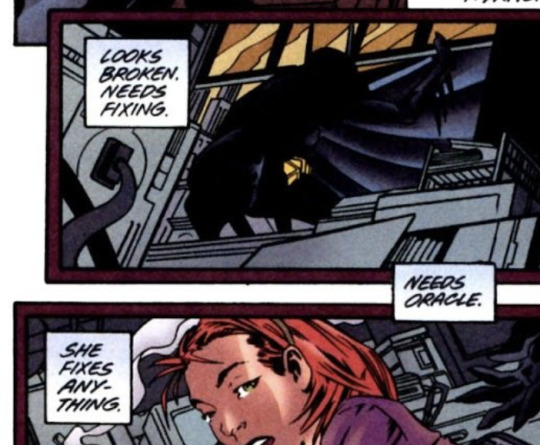
Batgirl (2000) #5
Babs was the person Cass went to whenever she had a problem, big or small. Despite Cass admiring and loving Bruce so much, whenever she needed advice she always went to Babs.
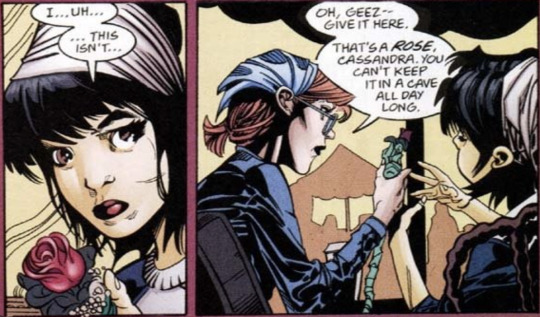

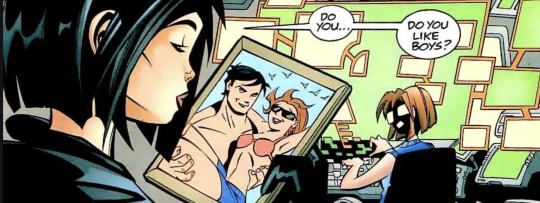
Batgirl (2000) #17 // 23 // 42
Cass is so attentive in all these instances. She often reads too much into Babs' responses, leading to her trying to emulate Babs in DC First: Batgirl/Joker by fighting the Joker, trying to emulate Babs' romances via Kon and Tai, and trying to embody Babs' Batgirl by donning her old costume.

This line from Batgirl (2000) #45 is the epitome of Cass asking for Babs' advice. Remember that in Cass' early days, being Batgirl was her first identity. Asking Babs what it was like to be Batgirl is essentially Cass asking for advice on how to be herself. Cass constantly tries to emulate Babs because she sees Babs as holding the key to her own identity.

Batgirl (2000) #5
"Tried to fix me. Teach me." To Cass, 'fixing' and 'teaching' are synonymous. Babs as her teacher also doubles as her 'fixer' - in a way, Cass sees Babs as a healer. It's no coincidence that Cass borrows Bruce's language for Leslie to describe her own relationship to Babs:
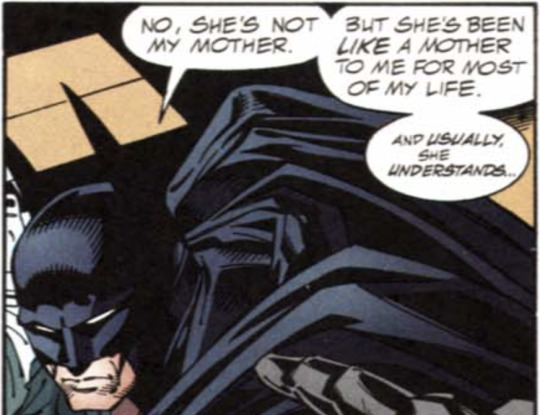
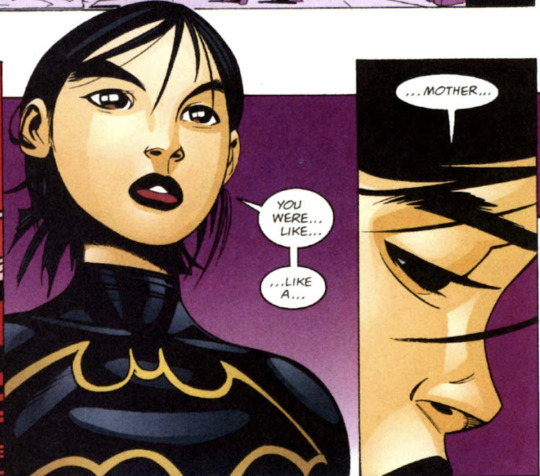
Batman Chronicles #18 // Batgirl (2000) #25
Cass is not only calling her "like a mother," she's also likening Babs (maybe subconsciously) to Leslie, a doctor. Leslie fixes up Bruce, just as Babs fixes up Cass. She doesn't just go to Babs for advice, but also for emotional support and healing.
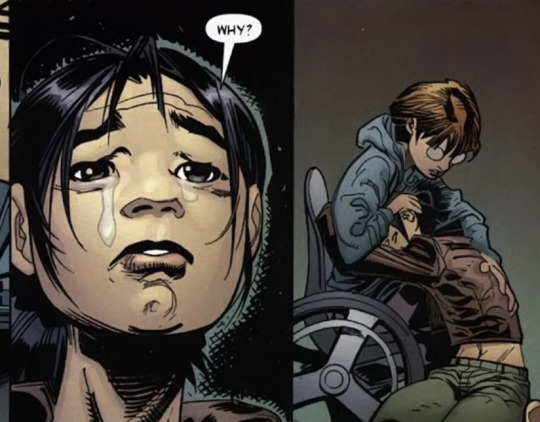
Batgirl (2000) #49
This moment is so pivotal to me. Like other times, Cass approaches Barbara with a question (why?). But she's not looking for an answer this time - she just wants Babs, just wants to feel the presence of someone who loves her. It's here that Babs' role as teacher/mother/healer converges into someone Cass goes to whenever she feels hurt or lost. Here, no words need to be said. Babs is speaking Cass' language.
Which is why Babs calling Cass stupid is so tragic. Cass' love for Babs is tied up in Babs teaching her, guiding her through life. To be called stupid from the person who has all the answers, who you went to for guidance, who fixed you up and healed you - it was devastating.

Batgirl (2000) #54
Babs doesn't realise that Cass has been learning from her; the lessons Babs taught her weren't about literature, but were on how to live, how to love, how to be Batgirl and how to be Cassandra Cain. Babs not only dismisses Cass' efforts to learn English, but also all those other lessons that Cass knows she has learned but Babs doesn't catch. I think it's in this moment that Cass realises how little Babs actually understands her.
Babs essentially implies Cass is 'unteachable', which to Cass means Babs is no longer the person who fixes anything. So she leaves.


Their reconciliation in Batgirl (2000) #67 is also interesting. On Cass' quest to find her mother (who she thinks might be Shiva), she once again links motherhood to teaching ("Shiva wants to... teach?"). But here, Babs attempts to stop teaching Cass. She stops herself from correcting Cass' language.
Now, Babs talks about what Cass has taught her:
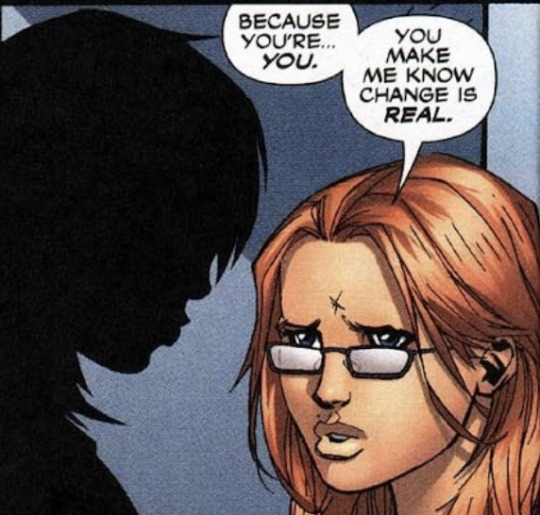
"You make me know change is real." I think this line is really important to Cass. For the first time, she's seeing that she has stuff to teach Babs - and Babs is letting her see that, as a way of apology. Babs finally actually addresses Cass' disability, too. They reconcile and, when Babs tells Cass to call, Cass says "The phone's two-ways." Their new relationship is built on a bedrock of mutual respect, where they can both now teach and learn from each other.
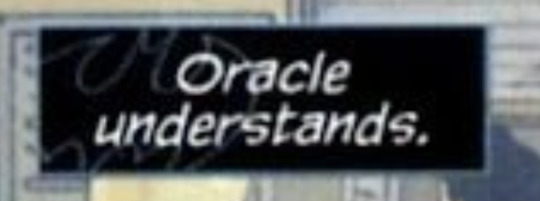
Batgirl (2008) #2
Now, Babs understands. They've gone through those ups and downs and come through with something different, something stronger. Cass still asks Babs for favours, and Babs still worries about Cass, but it's grounded in something less unequal and more trusting.
All this to say that a Cass without that core emotional connection to Babs just isn't really Cass. Babs was so integral to her sense of self and her development, and even when they drifted apart, they always came back together again. Babs was her mentor, her teacher, her mother figure; she went to her for guidance, love, and support. And I just wonder how not having Babs impacts current Cass. When she's hurting, or confused, or lost, or lonely - who does she go to now?
300 notes
·
View notes
Video
Astronaut readjusts to life back on Earth
> Don’t give him a baby for a while.
2M notes
·
View notes
Note
a lot of people think the point of ned's character is to highlight the folly of unyielding loyalty to a broken sense of honor but if grrm wanted the point of ned's character to be his folly he wouldn't have people fighting for "ned's girl" in his memory out of love, if they're looking for "deconstruction of blind allegiance to unfounded codes of honour" that's BARRISTAN!
yes let’s rant okay.
i think people really undersell the effect r+l=j on who he is and how he acts. people understand it as a fun plot twist rather than like, the hinge upon which his life swings. this is partially bc we still technically don’t know that rhaegar & lyanna are jon’s parents so we haven’t seen its true effects and partially because the show treats it as just a fun plot twist. it Only exists to make drama between jon & dany, it has no actual effect on their characters or anyone around them. like, arya and sansa are not going to have a more emotional reaction to finding out ned was lying to their mom? that robb will never know the truth? that rickon died in jon’s arms and HE will never know the truth? and dany like, had NO REACTION to him being RHAEGAR’S son, the man she has admired and based herself off of (not that they include this aspect of them at all 🤧).
but it’s not a plot twist to ned, it’s his life. and the chain of events goes robert forgives and even condones the murders of aegon & rhaenys -> ned leaves -> lyanna begs him to protect jon -> lyanna dies -> ned immediately reconciles with robert. it’s like that one sansa & starvation graphic i made, im talking about the action and effect here. why does ned move so goofy regarding robert? is it because he has unyielding loyalty to robert’s regime? or is it because he’s scared robert will find out he’s been lying to him for fifteen years? is it folly for ned to be against child killing? or is it a moral code that is Correct but at odds with the world he lives in, and based on his own fears of Jon being killed? like, people are always saying he’s too honorable, too loyal to robert but - he’s not! every moment people point to about him being ~too honorable~ are moments he is clearly acting out of fear of robert’s temper! he does not cover for robert’s temper, he does not allow robert to get away with shit, he spends every step in the capital arguing with robert until robert gets so annoyed he straight up leaves!
his life is before and after, and in the after he finds that he cannot live with the sort of man robert is, something lyanna knew long before ned. THATS his story. it’s not loyalty to a code that is based on nothing, it’s this frozen fear of discovery because he knows that if he sits and thinks too hard about it, he will realize that his best friend is a monster. it’s about ned REALIZING the code is based on nothing. what matters is not what everyone else thinks honor is, it’s what You as a person can live with morally, and it’s why, when he’s sitting in the dark dungeons, his thoughts are with lyanna, with jon, with sansa - he compromised his honor for love once, and he does it one more time before he dies. It’s not the “honorable” thing but it’s the right thing, and Ned’s story is very much about realizing he cannot do what is right while he is tied to Robert Baratheon.
134 notes
·
View notes
Text
Ah these children who always create problems for poor mothers....
47K notes
·
View notes
Text
Images from the No Kings protest on Saturday, June 14, 2025:
Minnesota:


Chicago:

San Diego:

Dallas:

Seattle:

San Francisco:

Philadelphia:

Los Angeles:

(source 1, source 2, source 3, source 4, source 5, source 6, source 7, source 8, source 9)
21K notes
·
View notes
Text
ultimately the truth about frankenstein is that we are all grotesque amalgamations of the best and worst parts of everyone who came before us. and sometimes the people who are supposed to love us because of and in spite of this will not. and we can kill them with hammers for that. and i think that’s beautiful
54K notes
·
View notes
Text
Legion S02E06
OK! So, I have not read many Legion comics yet. Bits and pieces here and there. I like the TV show, am trying to force myself through his stories in New Mutants and hating it, blah blah blah. Take what I say as coming from a place of well-meaning ignorance.
Apropos of coming across a conversation about how Gaby Haller is the devil because "with medication David could've had a normal life:" this is how medication can actually look, is the thing. I was like that on clozapine and later on olanzapine. While on olanzapine, my psychiatrist thought that the move here was to also prescribe a antidepressant lol. Bad mix, almost died. Her solution: let's try a different antidepressant. Shockingly, did not work out better.
Sometimes medication does work. But an important thing I want to impress upon people here is that medication simply doesn't work well for about 30 - 40% of schizophrenics. An important part of understanding this disorder is that there is a perception, both in the outside world and, dangerously, within psychiatry, that we have access to this magical pill that makes us normal, and we just don't like the side effects or are too stupid to keep taking said pill.
What's actually going on is that often these medications can often create a separate, equally disabling condition, as we see with David here. Except, because we can perhaps hold a very rudimentary conversation and a menial job while in this medicated state, this is considered "less disabled," thus the medication has made us "better."
This is because of a selective focus on symptoms like emotional outbursts and disorganized speech, which often take priority because they're more disruptive to other people. That is, regardless of the actual wellbeing of the schizophrenic being treated. We're still disabled, but quietly instead of loudly, via severe sedation.
Please note the way David's sister polices his medication, too. Thaaat's medical abuse baybeeeee, that's what Mad Pride people are often pissed off about, the way these pharmaseutical relationships destroy family as a place of trust and support whilst one is dependent upon them for survival. Part of how medical abuse within the family is so insidious is that the abuser often does not realize or understand that they are being abusive, or rather, they know they're "hurting," but believe it is "to help." These situations are not black and white, disabled families and especially schizophrenic families are by nature extremely complex, but this specific dynamic here with these specific characters, when we know how David can be in other environments and so on, makes it pretty clear that Amy is off mark.
Pharmacotherapy for people with dissociative identity disorder, as David in the comics is apparently usually written to have, is itself a different beast in the same field. Rates of effective treatment via medication obviously aren't 100%. They share much of the same circumstances with schizophrenics, and when people talk about "the mentally ill" and paint antipsychotics as magical pills, they mean both of us tbh lol. They don't discriminate like that.
Now, maybe there's an arc in the comics I'm not aware of where antipsychotics fix him. Writers who work for DC and Marvel treat research like me Muslim mate treats the beers, so it wouldn't shock me. But! If that does happen I consider it less interesting on principle, to be totally honest.
I like Clozapine David from the TV show as a statement against the characterization of pills as the silver bullet treatment, and the "cruel to be kind" familial dynamics we often find ourselves in.
With that in mind, idk man, Gaby Haller's moves are dubious, but the medication thing is Complex.
9 notes
·
View notes
Text

Magneto giving this part of his speech through a Sentinel is just absolute poetry. He has finally come to understand that he was trying to do to humans just what they had been doing to him and his people. It's one of those things that visual mediums like comics can do so well, and it is so beautiful when they get it right.
20 notes
·
View notes
Text
My specific read on John is not that he's a nice guy, either. It's that, like any good character (specifically a tragic character, which, TM has said that he is modeled on a mythical tragic hero, so) he has a flaw that dooms him. And what that means is, when he has the choice to change what he's doing, that flaw either prevents him from taking the option he's aware of, or prevents him from being aware that there is another option altogether.
And so as a writer, what I look for are moments where either:
something good about a character becomes an excess that harms themselves or others
we receive information that shows a persistent blind spot a character has
we look for times when a character gives their view of the world/a situation and it Does Not Match Up with reality, or is hinted that it doesn't
we look for evidence of something simmering under the surface that clashes with their outward, agreeable presentation
What fills that role for John?
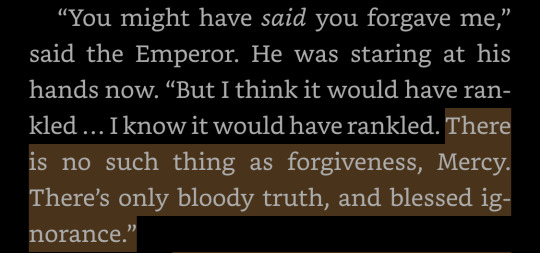
Yep.
When this first pops up, it's pretty easily dismissed as yet another layer on the falsehood he's propped up. Admittedly, he's been doing it for ten thousand years, so it's probably got a few layers to it.
However:

This one, to me, gives us a hint about what John is blind to: That his friends see his vindictiveness and his failings and that they could still love him. This is where it crosses into tragedy, for me; where his own inability to forgive blinds him to the capacity that other people have for generosity--and so, to a world where "justice" means more than "vengeance for the dead".
And this illuminates the whole chain of events that leads him to that climactic scene in Harrow the Ninth, telling Mercy that she never would have forgiven him anyways:
John is, at heart, deeply angry--like most characters in the series, and like a lot of people who grew up in poverty, especially if they managed to escape it. He also has some deep sense of justice, and deep sense of judgment.
So we have this cycle of related emotions and ideas: Justice, judgment, outrage. And a human measure of selfishness, amorality, double standards, etc.
In one situation, this allows him to throw himself completely into the cryo project, something that (if it hadn't been sabotaged politically) could have made a difference to humanity. He brings in people who work to make it even better, who demonstrably want to make the outcome as just and humane as possible. It's also implied that this is part of why he received those powers; "I chose you to change."
(And, I'll be honest, one of the other things that I see that chafes me is the implication that there was nothing about John to recommend him to the Earth. I'm actually of the opinion that there was; she chose him, and I don't think she just rolled a d100 or drew a card off a tarot deck and called him up. John is also still a human, flawed person.)
Then, the situation changes. It's no longer an issue of dedicating expertise to solve a problem; this is a political issue, and specifically of rich people using their resources to shift outcomes towards the one they think will benefit them the most, that will secure their survival, explicitly at the expense of everyone else.
And their strategy is, profoundly: short-sighted and unnecessary (pooling resources would help create a better outcome for everyone, including the rich, by reducing global trauma and preserving more of the systems that already structure their world); bigoted and uninformed (many rich people think that the world has to be a certain way, generally that the world is violent, competitive, dog-eat-dog, etc., and someone has to be "on top", and there will always have to be a loser, or lots of losers); and utterly cruel, unjust, and pointless.
And John--John, who grew up poor, who grew up aware of the despair around him and the injustice of his position and more than likely made use of that anger to achieve what he had up to this point--John is so angry.
Because they're all the same. They're all the same. It's the same song, over and over again, no matter how stupid and pointless and unnecessary. He is certain, beyond a shadow of a doubt, that it doesn't have to be this way. He passes judgment.
But John is losing to them, because he doesn't have the resources they do. He can hate them and fight them all he wants, and it doesn't matter, because he's nowhere near in the same league as they are politically.
And then, after the cryo project is cancelled, he gains his powers.
The thing about anger and judgment is that the deeper it runs, often, the more invested the person who holds that anger in themselves is in not seeing what they hate in themselves. E.g: John has conceptualized the people he's resisting as fundamentally unjust, cruel, amoral, and bigoted. There's a very good chance--to different degrees, depending on the person--that becoming aware of similar traits in himself might wake up those feelings he has towards those other people--aimed at himself (that is, cognitive dissonance). He can't see the things he's passed judgment on in himself and function. He's not like them; he's trying to fix things, to bring about justice.
Of course, there's justice as in "living in a just society", and justice as in "justice for the dead". But that's a later realization, because right now, everyone is still alive.
So John hides those parts of himself; from himself, from other people. So thoroughly he can exclude it from his consciousness and pretend it doesn't exist. He thinks no one sees the real depth of his own rage, his own cutthroat pursuit of a solution. And then, when he can't pretend it doesn't exist, he can still pretend to be the man he thinks they need him to be. He can "fool" them. He can say--he's trying. He screwed up. He doesn't know what he's doing.
And then, Casseiopeia says, No, actually, we know you, and we know you're horribly vindictive. And we're on your side--we're on the same side--our fight is your fight--and we love you. But your drive for revenge is seriously limiting your ability to imagine and create a living, just world, and that's what we're fighting for. Remember? That's what we set out to create.
And John's brain can't quite handle this; he can't imagine that they could actually see him and still be on his side. Because he couldn't see that and still be on his side. He can't forgive; he can't imagine forgiveness.
He can't see the things he's passed judgment on in himself and function.
And, by this stage, in some ways, it's already too late to change course. But this is one of several "come to Jesus" (no pun intended) moments where John could become aware of alternatives, or could change his behavior--and doesn't.
And I think this is where we get that self-awareness from, the thing that makes him creepy and tragic but also infuriating: He is aware, but apparently that's not enough to stop him from being his worst self--so is he just pretending to be moral? Capable of making different choices but choosing not to? And the weird statements he makes later:
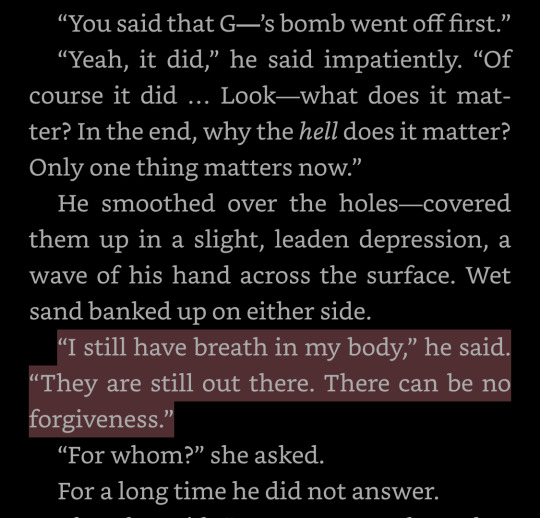
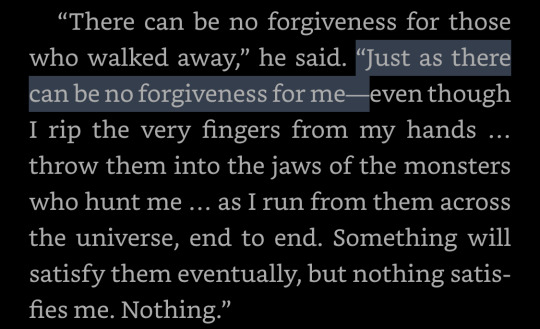
This is, imo, not a power-hungry dictator who genuinely doesn't care about the cost of his throne, or a gleefully predatory abuser. This is a dude who's committed to a course of action and doesn't feel great about it. This is a guy who has violated his own sense of justice and has to live with it.
This is a guy who set out to save the world, killed it, and now the only thing that's left to him is to avenge it.
And like, from a mythology standpoint, that is exactly what the Erinyes are, like the Furies and Alecto. They are not the justice of Apollo or Athena. They are screaming for blood. They are hunting their quarry to the ends of the universe. They are chthonic.
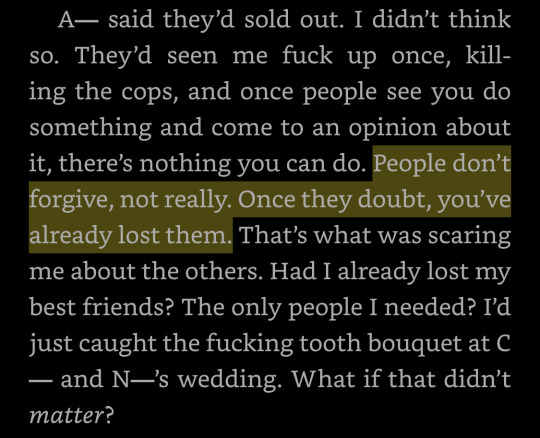
Again: This isn't what Cassieopeia or Christabel said to him. This is what John has said to himself. This came from him. This is a reflection of what he believes.
And it encapsulates, exactly, why he erased their memories. Why he took away their agency.
The difference between him and many, many people is he had the power of a god and no one to check him when he was struggling with his own worst impulses. And then, he created a world where no one could, not just because then he could do what he wanted and pretend to be kind and loving and moral, but so that he would never have to lose the love of the people he needed.
Because, unfortunately, he still needed them.
It just took ten thousand years for the lie to unravel.
732 notes
·
View notes
Text
Two Democrat politicians have been shot in Minnesota in their separate homes.
Democratic state representive Melissa Hortman has died alongside her husband, Mark.
John Hoffman and his wife, Yvette were both shot multiple times and are currently in and out of surgery.
The attacks are, unsurprisingly, being treated as political motivated assassinations.
684 notes
·
View notes
Note
None of what your anon is saying is true.
Blue Marvel's technology allowed Storm to travel to the Waiting Room--an afterlife--with her physical body, so that she could find Magneto and convince him to return. He brought himself back to life, using the key given to him by Namor in Hickman's Giant-Size X-Men series.
Sinister did not create the resurrection system. The Five were assembled by Charles and Moira, using Moira's knowledge of the future. Cerebro was Charles' own invention. Combining Cerebro with the Five is what enables Krakoan resurrection. Sinister created a storage system for them to preserve human genetic material so that they could still resurrect the dead without having their original bodies. It's the justification for why Charles is still able to resurrect the victims of Genosha, but it's not a component of the resurrection system itself.
Magneto did not replace Apocalypse in the crucible. That was the Silver Samurai.
i think contrary to kitty pryde magneto was resurrected with the help of blue marvel's technology and only his technology
magneto was spared from a resurrection through nazi tech compared to kitty and all the jewish mutants, scott summers, captain america (thanks for that nightcrawler), nightcrawler, ...
magneto is lucky even if for me, he got ruined him regardless... by spurrier. he had him take apocalypse's place at the crucible as he was the one to violently slay the cowering depowered mutants in the arena since en sabah nur left
Hi nonny.
Let me get this straight.................
So.....the ressurections plans Krakoa had...are from a Nazi?
3 notes
·
View notes
Text
Learning that certain things that you thought were widely accepted at the time actually had a lot of pushback kind of shakes up your perception of the world a little.
Like for example when a lot of people in the 1400s and 1500s read the Malleus Maleficarum, basically the book that set off the trend of witch trials in Europe, they knew it was bad and even called it unethical. And before 1400 most people in Europe didn’t even believe that witches existed. Because most Christians before the 1400s didn’t even believe that magic existed. Because “magic” was thought to come from pagan gods, and, you will note, most monotheists don’t believe that other gods exist. So witches weren’t even something that people thought about.
And when Christopher Columbus was off committing crimes against humanity a bunch of people were like “Hey, this guy is committing crimes against humanity. Someone stop him.” And eventually they did, even if they did stop him far too late. He was fired from his position as governor. He was arrested and banished from Spain. And there were people, both native South Americans and Spaniards, who actively opposed the colonization efforts while they were happening.
33K notes
·
View notes
Text

“caught in the crossfire” is crazy work when it’s your own reporter and it’s a video where you can just watch the cop aim directly at her and shoot her completely 100% on purpose with your own two eyes
33K notes
·
View notes
Text
Everything I have ever read about the BTS of Buffy and Angel makes it sound like A) Noxon took immediate control of the writer's room and got more more control over production as the show went on and she needed to have it B) Greenwalt kept that man on a leash
The more I read Joss Whedon's X-Men, the more comfortable I feel in the belief that Buffy and Angel were the product of an extremely well-stocked writer's room and incredible acting talent that worked in spite of Joss Whedon lol.
17 notes
·
View notes









